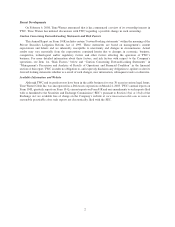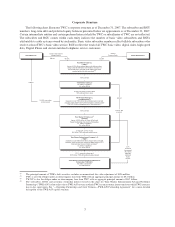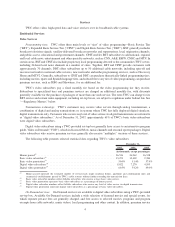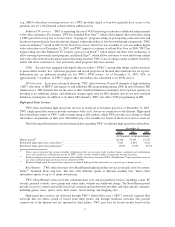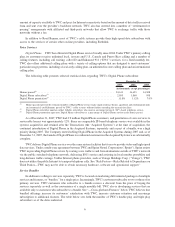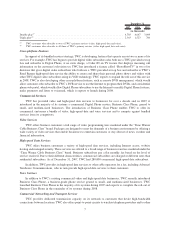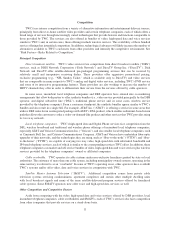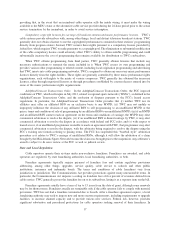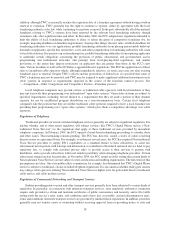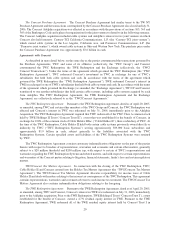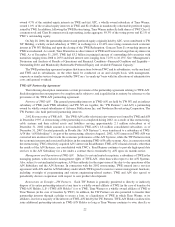Time Warner Cable 2007 Annual Report Download - page 17
Download and view the complete annual report
Please find page 17 of the 2007 Time Warner Cable annual report below. You can navigate through the pages in the report by either clicking on the pages listed below, or by using the keyword search tool below to find specific information within the annual report.Video competition. TWC’s video services face competition on a stand-alone basis from a number of different
sources, including:
• local television broadcast stations that provide free over-the-air programming which can be received using
an antenna and a television set;
• local television broadcasters, which in selected markets sell digital subscription services; and
• video programming delivered over broadband Internet connections.
TWC’s VOD services compete with online movie and other services, which are delivered over broadband
Internet connections, online order services with mail delivery, and with video stores and home video services.
“Online” competition. TWC’s high-speed data services face or may face competition from a variety of
companies that offer other forms of online services, including low cost dial-up services over ordinary telephone
lines, and developing technologies, such as Internet service via power lines, satellite and various wireless services
(e.g., Wi-Fi), including those of local municipalities.
Digital Phone competition. TWC’s Digital Phone service also competes with wireless phone providers and
national providers of IP-based telephony products such as Vonage. The increase in the number of different
technologies capable of carrying voice services has intensified the competitive environment in which TWC operates
its Digital Phone service.
Additional competition. In addition to multi-channel video providers, cable systems compete with all other
sources of news, information and entertainment, including over-the-air television broadcast reception, live events,
movie theaters and the Internet. In general, TWC also faces competition from other media for advertising dollars. To
the extent that TWC’s products and services converge with theirs, TWC competes with the manufacturers of
consumer electronics products. For instance, TWC’s DVRs compete with similar devices manufactured by
consumer electronics companies.
Commercial competition. TWC’s commercial video, high-speed data, voice and networking and transport
services face competition from local incumbent telephone companies, especially AT&T and Verizon, as well as
from a variety of other national and regional business services competitors. These companies include facilities-
based business service providers, such as Level 3 Communications, Inc., Time Warner Telecom Inc. and XO
Communications, LLC, which provide fiber optic services to enterprise and small- to medium-sized business
customers, smaller regional competitive local exchange carriers (“CLECs”) that offer voice and data services using
local access lines leased from local incumbent telephone operators, and national providers of IP-telephony products
such as Vonage, which provide voice and/or data services on a residential broadband connection.
Franchise process. Under the Cable Television Consumer Protection and Competition Act of 1992,
franchising authorities are prohibited from unreasonably refusing to award additional franchises. In December
2006, the FCC adopted an order intended to make it easier for competitors to obtain franchises, by defining when the
actions of county- and municipal-level franchising authorities will be deemed to be unreasonable as part of the
franchising process. Furthermore, legislation supported by regional telephone companies has been proposed at the
state and federal level and enacted in a number of states to allow these companies to enter the video distribution
business without obtaining local franchise approval and often on substantially more favorable terms than those
afforded TWC and other existing cable operators. Legislation of this kind has been enacted in California, New
Jersey, North Carolina, South Carolina and Texas. See “Regulatory Matters—State and Local Regulation” and
“Risk Factors—Risks Related to Government Regulation.”
Employees
As of December 31, 2007, TWC had approximately 45,600 employees, including approximately 1,600 part-
time employees. Approximately 5.0% of TWC’s employees are represented by labor unions. TWC considers its
relations with its employees to be good.
12


